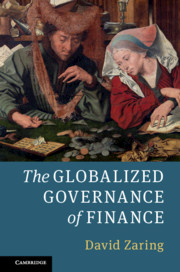Book contents
- The Globalized Governance of Finance
- The Globalized Governance of Finance
- Copyright page
- Dedication
- Contents
- Acknowledgments
- 1 A Transformative Forty Years
- 2 The Structure and Rules of the Globalized Governance of Finance
- 3 Banking, Global Oversight’s Ne Plus Ultra
- 4 Securities Regulation: Cooperation Instead of Harmonization
- 5 Cooperation in Insurance: a Slow Start, but a Fast Present
- 6 The Other Networks of Financial Regulation
- 7 International Financial Regulation and International Law
- 8 International Financial Regulation and China
- 9 The Next Financial Crisis
- Index
6 - The Other Networks of Financial Regulation
Published online by Cambridge University Press: 22 November 2019
- The Globalized Governance of Finance
- The Globalized Governance of Finance
- Copyright page
- Dedication
- Contents
- Acknowledgments
- 1 A Transformative Forty Years
- 2 The Structure and Rules of the Globalized Governance of Finance
- 3 Banking, Global Oversight’s Ne Plus Ultra
- 4 Securities Regulation: Cooperation Instead of Harmonization
- 5 Cooperation in Insurance: a Slow Start, but a Fast Present
- 6 The Other Networks of Financial Regulation
- 7 International Financial Regulation and International Law
- 8 International Financial Regulation and China
- 9 The Next Financial Crisis
- Index
Summary
This chapter reviews the accomplishments of the networks that form the periphery, rather than the core, of financial regulation, and places them into the larger context of international financial regulation. It is organized around their roles in the signature post-crisis regulatory institution: The Financial Stability Board’s “Compendium of Standards,” which looks to core principles from networks beyond the Basel Commission, IOSCO, and IAIS that it views as fundamental for a well-working system of financial oversight. The existence of so many financial regulatory institutions, even if some are quite small and amount to little more than task forces within the ambit of the Basel Committee, suggests that financial regulation still remains a task-specific, disaggregated enterprise. Consider, for example, deposit insurance. It is conceivable that the Basel Committee or IAIS could develop principles for effective deposit insurance on their own; deposit insurance contributes to financial stability, which is the raison d’etre of the Basel Committee, and it’s an insurance product that insurance supervisors, in theory, understand (perhaps only in theory – deposit insurance is more commonly thought of as a tool for bank regulators). The fact that Basel and the IAIS haven’t done so is a testament to the regulatory fragmentation of financial oversight.
Keywords
- Type
- Chapter
- Information
- The Globalized Governance of Finance , pp. 99 - 121Publisher: Cambridge University PressPrint publication year: 2019

